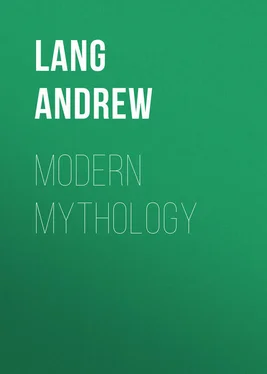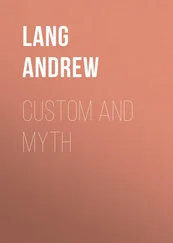Andrew Lang - Modern Mythology
Здесь есть возможность читать онлайн «Andrew Lang - Modern Mythology» — ознакомительный отрывок электронной книги совершенно бесплатно, а после прочтения отрывка купить полную версию. В некоторых случаях можно слушать аудио, скачать через торрент в формате fb2 и присутствует краткое содержание. Жанр: foreign_antique, foreign_prose, на английском языке. Описание произведения, (предисловие) а так же отзывы посетителей доступны на портале библиотеки ЛибКат.
- Название:Modern Mythology
- Автор:
- Жанр:
- Год:неизвестен
- ISBN:нет данных
- Рейтинг книги:4 / 5. Голосов: 1
-
Избранное:Добавить в избранное
- Отзывы:
-
Ваша оценка:
- 80
- 1
- 2
- 3
- 4
- 5
Modern Mythology: краткое содержание, описание и аннотация
Предлагаем к чтению аннотацию, описание, краткое содержание или предисловие (зависит от того, что написал сам автор книги «Modern Mythology»). Если вы не нашли необходимую информацию о книге — напишите в комментариях, мы постараемся отыскать её.
Modern Mythology — читать онлайн ознакомительный отрывок
Ниже представлен текст книги, разбитый по страницам. Система сохранения места последней прочитанной страницы, позволяет с удобством читать онлайн бесплатно книгу «Modern Mythology», без необходимости каждый раз заново искать на чём Вы остановились. Поставьте закладку, и сможете в любой момент перейти на страницу, на которой закончили чтение.
Интервал:
Закладка:
‘Taking all these facts together, it is not difficult to imagine how the story of Tuna’s brain grew up; and I am afraid we shall have to confess that the legend of Tuna throws but little light on the legend of Daphne or on the etymology of her name. No one would have a word to say against the general principle that much that is irrational, absurd, or barbarous in the Veda is a survival of a more primitive mythology anterior to the Veda. How could it be otherwise?’
Now (1), as to Daphne, we are not invariably told that hers was a case of ‘the total change of a heroine into a tree.’ In Ovid 18 18 Metam . i. 567.
she is thus changed. In Hyginus, on the other hand, the earth swallows her, and a tree takes her place. All the authorities are late. Here I cannot but reflect on the scholarly method of Mannhardt, who would have examined and criticised all the sources for the tale before trying to explain it. However, Daphne was not mangled; a tree did not spring from her severed head or scattered limbs. She was metamorphosed, or was buried in earth, a tree springing up from the place.
(2) I think we do know why the people of Mangaia ‘believe in the change of human beings into trees.’ It is one among many examples of the savage sense of the intercommunity of all nature. ‘Antiquity made its division between man and the world in a very different sort than do the moderns.’ 19 19 Grimm, cited by Liebrecht in Zur Volkskunde , p. 17.
I illustrate this mental condition fully in M . R . R . i. 46-56. Why savages adopt the major premise, ‘Human life is on a level with the life of all nature,’ philosophers explain in various ways. Hume regards it as an extension to the universe of early man’s own consciousness of life and personality. Dr. Tylor thinks that the opinion rests upon ‘a broad philosophy of nature.’ 20 20 Primitive Culture , i. 285.
M. Lefébure appeals to psychical phenomena as I show later (see ‘Fetishism’). At all events, the existence of these savage metaphysics is a demonstrated fact. I established it 21 21 Op . cit . i. 46-81.
before invoking it as an explanation of savage belief in metamorphosis.
(3) ‘The Tuna story belongs to a very well known class of ætiological plant-stories’ (ætiological: assigning a cause for the plant, its peculiarities, its name, &c.), ‘which are meant to explain a no longer intelligible name of a plant, &c.’ I also say, ‘these myths are nature-myths, so far as they attempt to account for a fact in nature – namely, for the existence of certain plants, and for their place in ritual.’ 22 22 M . R . R . i. 160.
The reader has before him Mr. Max Müller’s view. The white kernel of the cocoanut was locally styled ‘the brains of Tuna.’ That name required explanation. Hence the story about the fate of Tuna. Cocoanut was used in Mangaia in the sense of ‘head’ ( testa ). So it is now in England.
See Bell’s Life , passim , as ‘The Chicken got home on the cocoanut.’
On the whole, either cocoanut kernels were called ‘brains of Tuna’ because ‘cocoanut’=‘head,’ and a head has brains – and, well, somehow I fail to see why brains of Tuna in particular! Or, there being a story to the effect that the first cocoanut grew out of the head of the metamorphosed Tuna, the kernel was called his brains. But why was the story told, and why of Tuna? Tuna was an eel, and women may not eat eels; and Ina was the moon, who, a Mangaian Selene, loved no Latmian shepherd, but an eel. Seriously, I fail to understand Mr. Max Müller’s explanation. Given the problem, to explain a no longer intelligible plant-name – brains of Tuna – (applied not to a plant but to the kernel of a nut), this name is explained by saying that the moon, Ina, loved an eel, cut off his head at his desire, and buried it. Thence sprang cocoanut trees, with a fanciful likeness to a human face – face of Tuna – on the nut. But still, why Tuna? How could the moon love an eel, except on my own general principle of savage ‘levelling up’ of all life in all nature? In my opinion, the Mangaians wanted a fable to account for the resemblance of a cocoanut to the human head – a resemblance noted, as I show, in our own popular slang. The Mangaians also knew the moon, in her mythical aspect, as Ina; and Tuna, whatever his name may mean (Mr. Max Müller does not tell us), was an eel. 23 23 Erratum: This is erroneous. See Contributions , &c., vol. i. p. 6, where Mr. Max Müller writes, ‘Tuna means eel.’ This shows why Tuna, i . e . Eel, is the hero. His connection, as an admirer, with the Moon, perhaps remains obscure.
Having the necessary savage major premise in their minds, ‘All life is on a level and interchangeable,’ the Mangaians thought well to say that the head-like cocoanut sprang from the head of her lover, an eel, cut off by Ina. The myth accounts, I think, for the peculiarities of the cocoanut, rather than for the name ‘brains of Tuna;’ for we still ask, ‘Why of Tuna in particular? Why Tuna more than Rangoa, or anyone else?’
‘We shall have to confess that the legend of Tuna throws but little light on the legend of Daphne, or on the etymology of her name.’
I never hinted that the legend of Tuna threw light on the etymology of the name of Daphne. Mangaian and Greek are not allied languages. Nor did I give the Tuna story as an explanation of the Daphne story. I gave it as one in a mass of illustrations of the savage mental propensity so copiously established by Dr. Tylor in Primitive Culture . The two alternative explanations which I gave of the Daphne story I have cited. No mention of Tuna occurs in either.
The Tuna story is described as ‘a clear case of disease of language cured by the ordinary nostrum of folk-etymology.’ The ‘disease’ showed itself, I suppose, in the presence of the Mangaian words for ‘brain of Tuna.’ But the story of Tuna gives no folk-etymology of the name Tuna. Now, to give an etymology of a name of forgotten meaning is the sole object of folk-etymology. The plant-name, ‘snake’s head,’ given as an example by Mr. Max Müller, needs no etymological explanation. A story may be told to explain why the plant is called snake’s head, but a story to give an etymology of snake’s head is superfluous. The Tuna story explains why the cocoanut kernel is called ‘brains of Tuna,’ but it offers no etymology of Tuna’s name. On the other hand, the story that marmalade (really marmalet ) is so called because Queen Mary found comfort in marmalade when she was sea-sick – hence Marie - malade , hence marmalade – gives an etymological explanation of the origin of the word marmalade. Here is a real folk-etymology. We must never confuse such myths of folk-etymology with myths arising (on the philological hypothesis) from ‘disease of language.’ Thus, Daphne is a girl pursued by Apollo, and changed into a daphne plant or laurel, or a laurel springs from the earth where she was buried. On Mr. Max Müller’s philological theory Daphne=Dahanâ, and meant ‘the burning one.’ Apollo may be derived from a Sanskrit form, *Apa-var-yan, or *Apa-val-yan (though how Greeks ever heard a Sanskrit word, if such a word as Apa-val-yan ever existed, we are not told), and may mean ‘one who opens the gate of the sky’ (ii. 692-696). 24 24 Phonetically there may be ‘no possible objection to the derivation of Απολλων from a Sanskrit form, *Apa-var-yan, or *Apa-val-yan’ (ii. 692); but, historically, Greek is not derived from Sanskrit surely!
At some unknown date the ancestors of the Greeks would say ‘The opener of the gates of the sky (*Apa-val-yan, i . e . the sun) pursues the burning one (Dahanâ, i . e . the dawn).’ The Greek language would retain this poetic saying in daily use till, in the changes of speech, *Apa-val-yan ceased to be understood, and became Apollo, while Dahanâ ceased to be understood, and became Daphne. But the verb being still understood, the phrase ran, ‘Apollo pursues Daphne.’ Now the Greeks had a plant, laurel, called daphne . They therefore blended plant, daphne, and heroine’s name, Daphne, and decided that the phrase ‘Apollo pursues Daphne’ meant that Apollo chased a nymph, Daphne, who, to escape his love, turned into a laurel. I cannot give Mr. Max Müller’s theory of the Daphne story more clearly. If I misunderstand it, that does not come from want of pains.
Интервал:
Закладка:
Похожие книги на «Modern Mythology»
Представляем Вашему вниманию похожие книги на «Modern Mythology» списком для выбора. Мы отобрали схожую по названию и смыслу литературу в надежде предоставить читателям больше вариантов отыскать новые, интересные, ещё непрочитанные произведения.
Обсуждение, отзывы о книге «Modern Mythology» и просто собственные мнения читателей. Оставьте ваши комментарии, напишите, что Вы думаете о произведении, его смысле или главных героях. Укажите что конкретно понравилось, а что нет, и почему Вы так считаете.












